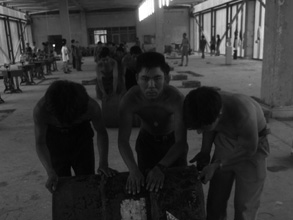He min gong tiao wu
Dance with Farm Workers
Wu Wenguang
China 2001 |
| |
|
 |
|
|
Arsenal 1
15.02., 10.00
CineStar 8
17.02., 19.00
|
|
|
|
|
Produktion: Wu Documentary Studio
(Beijing)
Weltvertrieb: Wu Documentary Studio
No. 4-501 Keying Sushe, 79# Bingjiaokou
Hutong Xinwaidajie, 100088 Beijing, China
Tel.: (86-10) 62 01 43 41
Fax: 82 08 50 22
e-mail: wuwengua@public3.bta.net.cn
Buch, Schnitt, Produzent: Wu Wenguang
Kamera: Su Ming
Ton: Zhang Xiaoyan
Format: Video (gedreht auf DV), Farbe
Länge: 90 Minuten
Sprache: mandarin |
|
|
|
|
Eine Dokumentation über eine unkonventionelle Performance,
an der sowohl mehrere Künstler als auch dreißig in Beijing
tätige
Landarbeiter aus den armen Regionen der Provinz Sichuan
mitwirken. Der Proben- und Aufführungsort ist die Werkhalle
einer ehemaligen Textilfabrik, die im Zuge der rapiden Modernisierung
Beijings jederzeit abgerissen werden kann. Die durchtrainierten
Landarbeiter, die ihre Hoffnung auf bessere Lebensverhältnisse
in ihrer Heimat verloren hatten und deshalb
in die Stadt gezogen waren, sind die tragenden Säulen dieser
Modernisierung – und dieser Performance. Sie stammen von verschiedenen
Baustellen Beijings und wollten zunächst nichts
weiter, als dreißig Yen pro Tag verdienen. Erst einige Zeit später
stellen sie fest, dass sie, die sonst zur untersten Schicht der
Gesellschaft gehören, mitten auf der Bühne stehen.
Diese Performance wird das Leben und Schicksal dieser Menschen
so wenig verändern können, wie dieser Dokumentarfilm
ihr Leben umfassend zeigen kann. Die Werkhalle ist inzwischen
in einen Vergnügungsort für die modernen, reichen Bewohner
Beijings umgewandelt worden. Die Landarbeiter sind zu ihren
Baustellen zurückgekehrt. Was mich tröstet: ich werde sie im
Anschluss an diese Arbeit weiter mit meiner Kamera begleiten
und ihr Leben, ihre Arbeit, ihre Hoffnung und ihr Schicksal festhalten.
Wu Wenguang
|
| |
|
|
A documentary about a very unconven-tional
performance: the project involved
not only actors and dancers, but also 30
Beijing farm workers from the poorer regions
of Sichuan province. In addition,
both the rehearsals and the performance
took place in the production hall of a former
textile factory that could soon be torn
down as part of Beijing’s rapid modernisation.
The superbly fit farm labourers, who
came to the city when they lost hope that
conditions would improve at home, are the
supporting pillars of this modernisation –
and also of this performance. The 30 farm
labourers working on building sites in
Beijing had at first the sole wish to be paid
30 yen a day. It was only some time later
that they discovered that they, the lowest
of the low, would be standing centre stage.
My aim as a documentary filmmaker was to
record the preparations for the performance.
The film was to focus on people who
are not normally at the centre of things
(i.e. the stage), people who are needed to
modernise the city of Beijing and then
quickly forgotten again. This performance
will do as little to change these people’s
lives and fates as the documentary can
show the full complexity of their lives. The
film is like a plant that flowers for a while
in a particular space. Today the curtain has
long fallen. The production hall has been
converted into an amusement park for
Beijing’s modern rich inhabitants. The farm
labourers have returned to the building
sites. My only consolation is that I will
continue to follow them with my camera,
documenting their lives, their work, their
hopes and their fates. Wu Wenguang
|
| |
|
Biographien / Biographies
Wu Wenguang, geb. 1956 in Yunnan/China. Zunächst Grundschullehrer,
dann Nachrichtenredakteur bei Kunming Television und China Center TV. 1991
Gründung des Wu Dokumentarfilmstudios in Beijing. Filme seit 1990,
u.a. My Time in the Red
Guards (Forum 1993), Jiang Hu: Life on the Road (Forum 2000).
|
